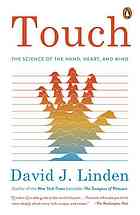
Touch
The Science of the Hand, Heart, and Mind
علم دست، tseTو ذهن
کتاب های مرتبط
- اطلاعات
- نقد و بررسی
- دیدگاه کاربران
نقد و بررسی

December 8, 2014
The sensation of touch, so ubiquitous in how we interact with our world, gets a sensualist pop-biology treatment from Linden (The Compass of Pleasure), a professor of neuroscience at the Johns Hopkins University School of Medicine. His exploration of the relationship between the things we feel with our fingertips and those we feel in our hearts begins with social touch and its lasting effects on babies and rats. Linden covers the basics of tactile receptor types and sensory maps before diving into several chapters—all appropriately science-based, yet somehow slightly lurid and intimate—on caresses, sexual arousal, and orgasm. In covering some common phenomena, he explains the experience of menthol’s cool and capsaicin’s heat as not merely a linguistic metaphor, but as a multitasking adaptation of sensory cells. He also addresses strange case studies that reveal biological quirks, such as the story of a woman who, left with an itchy but numb forehead after a bout of shingles, scratched straight through to her brain. Though it’s not exactly a neurobiology primer, Linden sandwiches a surprising amount of anatomical information between the stories of bad hand jobs and children who die young because they can’t feel pain. Illus.

December 1, 2014
A crisp reminder that the sense of touch is not to be taken lightly."Touch is not optional for human development," writes Linden (Neuroscience/Johns Hopkins Univ. School of Medicine; The Compass of Pleasure: How Our Brains Make Fatty Foods, Orgasm, Exercise, Marijuana, Generosity, Vodka, Learning, and Gambling Feel So Good, 2011, etc.) in this exploration of touch, from the tips of our toes to the tops of our skulls. Touch is critical from birth-"deprive a newborn of social touch...and a disaster unfolds"-and shapes the way we find our ways through the world via the circuitry of this "weird, complex, and often counterintuitive system." Social touch, on the whole, reinforces cooperation and loyalty, from professional sports players to packs of grooming primates. Depending on the nature of the social touch, it may soothe, reconcile, form alliances and reinforce bonds. Linden peruses the different sensors in the skin, the genetics of hot and cold, the sense of safety communicated by a particular caress, illusionary touches and our knowledge that "pain perception has an anatomically distinct emotional component." The author also spins out a hilarious story of an intimate yet strange morning with his girlfriend when he experienced significant confusion in the sensation-perception realm, and he provides a dissection of the orgasm that is at once transfixing (Linden's short course in neurology prepares readers for the description) and worthy of Woody Allen: "When we have an orgasm it feels like a transcendent, unified moment, not merely a collection of disparate sensations. We experience orgasms as intrinsically pleasurable and emotionally positive....For an orgasm, mix together the following ingredients...Serves: 1." Though the author includes a host of entertaining anecdotes, his narrative is consistently backed by solid science. So surpassing does Linden make touch seem that even turning the pages of his book becomes a pleasurable experience.
COPYRIGHT(2014) Kirkus Reviews, ALL RIGHTS RESERVED.

February 15, 2015
As neuroscience research progresses and more is known about how the brain functions, books describing the workings of the brain are becoming more specific, focusing on specific feelings or senses. Here best-selling author Linden (neuroscience, Johns Hopkins Univ.; The Compass of Pleasure; The Accidental Mind) covers the sense of touch. As in the author's previous works, he combines anecdotes, stories, history, and neuroscience research to cover his topic. Chapters address how we sense what we actively touch, how we sense things that come in contact with our skin (other people as well as substances), how touch interacts with emotions in intimate forms of touching, and how our touch sensors can cause problems or be fooled. Linden doesn't conduct touch research, but he does explain investigations by others and includes extensive figure descriptions and notes. Theories of how touch and emotions interact are considered. Those with a more scientific or clinical interest in the sense will be better served by Matthew Hertenstein and Sandra Weiss's The Handbook of Touch: Neuroscience, Behavioral, and Health Perspectives. VERDICT An exciting book for those interested in learning more about the sense of touch and how the brain performs.--Margaret Henderson, Midlothian, VA
Copyright 2015 Library Journal, LLC Used with permission.

December 1, 2014
Why does sexual touch feel good? What is the difference between being touched on one's palm or shoulder? Of all the senses, touch is by far the most underrated, according to Johns Hopkins neuroscience professor Linden (The Compass of Pleasure, 2011). Indeed, an infant born without sight or hearing can grow up to be a healthy adult. Likewise, people who lack the sense of smell or taste can live well by making a few adjustments to compensate for these deficiencies. Their bodies and brains will develop in a normal way relative to their disability. However, human beings quite literally cannot live without touching and being touched. So critical is touch, infants deprived of physical contact, even as little as an hour per day, will fail to thrive and will develop severe cognitive, social, and psychological disorders. Their bodies and minds will be permanently stunted, malformed. As Linden says, touch is not optional. This in-depth, awareness-raising discussion of the effects of touch from head to toe and back again sheds light on a fascinating yet overlooked topic.(Reprinted with permission of Booklist, copyright 2014, American Library Association.)

























دیدگاه کاربران